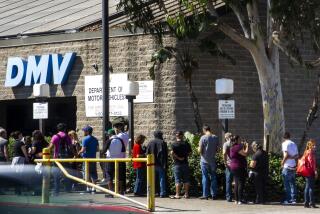Lost in a Fog
- Share via
Tell me the continents.
Tell me the continents.
Tell me the continents if you can.
North America, South America,
Europe, Asia, Africa.
Don’t forget Australia.
Don’t forget Australia.
Don’t forget Australia or Antarctica.
The 2 1/2- and 3-year-olds at a Pasadena nursery school can indeed tell you the continents because they’ve learned this little song, but America’s young adults can’t. They flunked a most basic geography test administered this spring in nine countries by the National Geographic Society. Americans finished sixth. Those of ages 18 to 24, presumably fresh from school and up to date, finished dead last.
“Our adult population, especially our young adults, do not understand the world at a time in our history when we face a critical economic need to understand foreign consumers, markets, customs, foreign strengths and weaknesses,” Gilbert M. Grosvenor, the geographic society’s president, said in releasing a survey by the Gallup Organization.
Nearly 11,000 adults in Canada, France, Italy, Japan, Mexico, Sweden, Great Britain, the United States and West Germany took the test. The Swedes did best; only the Italians and the Mexicans trailed the Americans.
Forty-five percent of adult Americans who took the test could not locate Central America on an unmarked world map. Only about one-third could identify Vietnam. Fewer than half of the Americans were able to identify Great Britain, France, South Africa and Japan, although almost 95% knew that most imported cars come from Japan.
In releasing the findings, the National Geographic Society reaffirmed its efforts to improve the teaching of geography, work that is already under way. For the past several summers the society, the California Department of Education and UCLA have cooperated on a summer teachers’ institute. The society also worked with the state to develop a mew emphasis on geography in history and social-studies guidelines adopted earlier this year. Bill Honig, the state superintendent of public instruction, for whom geography is a favorite subject, will use the guidelines in discussions with textbook publishers and curriculum planners.
Geography is not taught as a separate course in the Los Angeles city schools, and much must be done to improve its status in the curriculum. But, again, National Geographic is part of an experiment at Audubon Junior High School, in the Crenshaw area, aimed at improving geography instruction there and at other local schools.
Without such efforts, 82,000 schools invited to a national competition for fourth- to eighth-graders next spring--the first National Geography Bee--will find it a national embarrassment instead.
It is already embarrassing that only about half of adult Americans knew that the Sandinistas and the rebel Contras are fighting in Nicaragua; some placed the battlefield in Norway. Only 55% of Americans could identify South Africa as the home of apartheid. Most people surveyed were unaware that the host country of this summer’s Olympic Games will be South Korea.
Grosvenor said that the test proved one more thing: The Lost Generation has been found. But not if it has to read a map.
More to Read
Sign up for Essential California
The most important California stories and recommendations in your inbox every morning.
You may occasionally receive promotional content from the Los Angeles Times.













